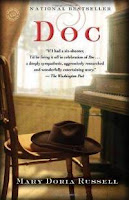A few more book reviews from the past year’s reading. (Part 1 is
here.)
★ ★ ★ ★ ★ Doc

Mary Doria Russell (2011)
I know you can’t judge a book by its cover, but on a trip to the local bookstore one day, that was what drew me to this brilliant novel about Doc Holliday. I’d been watching a lot of
American Experience documentaries on Old West icons—Annie Oakley, Jesse James—and I’d had my eye out for a sharp, authentic Western, something recently written and meticulously researched. And the sepia cover of
Doc practically jumped off the shelf at me.
Doc details a year in the life of Doc Holliday, long before he stood alongside the Earps in the infamous gunfight in Tombstone. The Doc in this novel is a younger man, far from his home in Georgia and still getting used to life the wild West—specifically, the busy cattle town of Dodge City, Kansas. Mary Doria Russell’s atmospheric prose captures the sights, hardships, and nuances of everyday life in the boom-and-bust Dodge; it’s the kind of writing that keeps you up at night just to experience it a little longer. And her Doc is equally compelling, a moody gambler and nightowl who doesn’t suffer fools, is handy with a gun, quotes Virgil and Homer to the deaf ears of the townies around him, and really just wants to be a good dentist. But what attracts our sympathy perhaps most is Doc’s debilitating illness—the relentless tuberculosis that we know will kill him only a few years later. And he’s not the only one in trouble; the shy, taciturn lawman Wyatt Earp has his hands full with Dodge’s mob of crooked businessmen and drunken cowboys. And there’s a murder mystery afoot, but honestly, it plays second fiddle to Russell’s powerful, lyrical writing. You don’t have to be a fan of Westerns to enjoy this exquisitely crafted work of literary fiction.
Doc was a surprise from beginning to end, and a rare book that I wished were longer so I could stay in its world a few more days.
 ★ ★ ★ The Tiger’s Wife
★ ★ ★ The Tiger’s Wife
Téa Obreht (2011)
This bestseller came riding in on a lot of hype, mostly because its author, Téa Obreht, was in her early 20s when she wrote it. And it’s an exciting debut, set in the war-battered Balkans. The plot that loosely holds the novel together—a young woman coming to terms with the death of her grandfather, who filled her childhood with fantastical tales from his own youth—is told mostly through interlinking stories. Obrecht’s deftly constructed narrative immerses the reader in the characters’ world with little backstory or exposition; dialogue and imagery do most of the work, which makes for a satisfying, sensory reading experience. But while the individual stories hold up beautifully on their own—any one of them would rock in a literary journal—the seams that hold them together sometimes seem hastily stitched. And there’s a lot of stopping and starting: Just as Obreht gets rolling with a great story, she abandons it and quick-cuts to another, starting over with a new character and a different historical era. So what could have been a stellar collection of short stories is shoehorned into a somewhat frustrating novel. And Obreht’s magic realism—anthropomorphized animals, larger-than-life heroes and villains, and a man who never dies—has been done before by Marquez and his many imitators and feels a little stale. I also found myself wondering whether this book would have attracted so much attention if it were set in Omaha instead of the former Yugoslavia, a land exotic to most American readers. So, while I give high marks to Obreht’s storytelling skills and expect to see her short fiction winning prizes for years to come, I found
The Tiger’s Wife to be less than the sum of its parts.
★ ★ ★ ★ The Leftovers

Tom Perrotta (2011)
This is another book that spent a lot of time on the bestseller list last year. And this one was right up my alley—a literary novel that feels like it could have been written by Richard Russo or Ethan Canin, but with a sci-fi premise. In this imaginative “what-if” novel, the leftovers are…well, everyone left on Earth. Two years before the novel begins, a strange event occurred: Millions of people—men, women, and children all over the world—simply vanished, leaving their bewildered loved ones behind. No one knows whether it was the Rapture or something else, but the world has been plunged into a sort of post-9/11 trauma, times infinity—the economy is in a shambles, and life has come to a virtual standstill as the grief-stricken survivors begin to realize that their missing family and friends are never coming back. But Perrotta isn’t going for cheap thrills with this provocative idea;
The Leftovers is a deft character study of a handful of people dealing with mourning, loss, and survivor guilt in its many permutations. As in most good literary novels, its characters’ stories don’t wrap up neatly, as well they shouldn’t—these people’s lives are profoundly broken, and there’s no going back. But
The Leftovers is anything but a downer; it’s a great read, full of human foibles and a surprising amount of wry humor.










